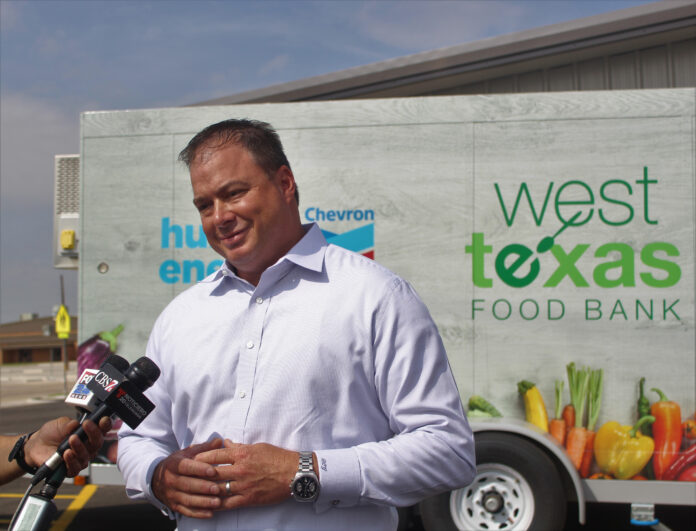STANTON After a delay, the West Texas Food Bank has finally been able to bring out the Produce Pod, which is designed to help roll out fresh produce into underserved areas of West Texas.
The project, which is in collaboration with Chevron, will help out rural areas as the West Texas Food Bank had a launch celebration at the new Martin County Food Pantry on Monday in Stanton.
The Produce Pod project was put on hold due to the pandemic but is now ready to roll out to the underserved rural areas in the 19 counties that the West Texas Food Bank serves.
“We’ve always been really proud of our relationship with Chevron,” West Texas Food Bank Executive Director Libby Campbell said. “They’ve done such amazing things for the West Texas Food Bank and the 19 counties that we serve. Chevron’s always been there to help with mobile distributions and with our partner agencies. Chevron’s always helped. They’ve always been really great with being innovative community corporate partners which is exactly what you need in the food bank business, especially during times like COVID.”
The West Texas Food Bank’s collaboration with Chevron also includes the Community Kitchen, which before the pandemic was serving around 1,500 children through the Kids Café and Summer Feeding Programs.
At the beginning of the pandemic, the feeding programs could not operate due to safety concerns but the kitchen did not cease operations.
“Before COVID, we were really looking at different ways to bring fresh produce into our 19 counties,” Campbell said.
Campbell said that being isolated, it can sometimes be harder to get fresh food out to the underserved areas in the 19 counties that the West Texas Food Bank covers.
This project will help bring fresh produce to those areas.
“(This will) give them an extra storage space or capacity immediately to help store cold items so they can hand those out to our clients,” Campbell said. “So for (Chevron) to be able to work with us and provide a solution for our partner agencies and our mobile distributions to provide immediate storage is huge. Of course, Chevron was able to jump on and always believed in our crazy, innovative ideas.”
The West Texas has seen an increase in the amount of food to help out the 19 counties that it serves.
“We went from 6.4 million pounds of food before COVID,” Campbell said. “We finished last year at 10.4 million pounds of food and this year, we’ll close out the year at 13.3 million pounds of food to the 19 counties that we serve. That’s a huge increase but we couldn’t do it without our corporate partnerships like Chevron.”
General Manager of Operations for Chevron Brent Gros said that Chevron supports the community and that food security is a huge part of helping the communities and for them to thrive.
“With the West Texas Food Bank, we talked about how we can further our partnership and the ability to provide produce to remote locations and keeping it cool was one of the challenges so through this partnership, we talked about a mobile produce pod that will help serve the need of not only providing produce locally but throughout the community,” Gros said. “We’re really happy today. I’m honored to launch the first chevron produce pod.”
Gros said that it feels great to be able to do this especially after the challenges posed to many people by the pandemic last year.
“So many people like kids, parents and elderly had a challenge providing food for their families and finding food on a daily basis so knowing that we can be a part of the equation to helping people is great,” Gros said.
For the West Texas Food Bank, it’s been a relief to finally get the long-awaited Produce Pod rolling.
“We originally had started building and got it underway a couple of months before COVID started and then, of course, with manufacturing stopping and everything slowing down, it put about a six-month stop the break process,” Campbell said. “When we finally did get the pod in, we just wanted to use it without ribbon-cutting so it was a huge relief for our rural partners who needed immediate capacity space.”




